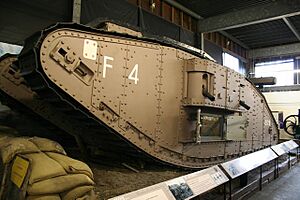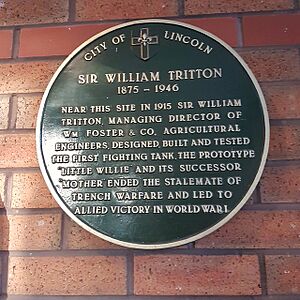William Tritton facts for kids
Sir William Ashbee Tritton (born June 19, 1875 – died September 24, 1946) was a British expert. He knew a lot about farm machines. He played a very important part in creating the first ever tanks. This happened during World War I. He worked with Major Walter Gordon Wilson and Lancelot De Mole. At first, he was asked to make strong tractors. These tractors were needed to move big guns. This work eventually led to the invention of the tank!
Early Life and Education
William Tritton was born in Islington, a part of London, in 1875. His father was a stockbroker in London. William went to school at Christ's College, Finchley. He also studied at King's College London. By 1901, he was living in Altrincham.
Building the First Tanks
In 1906, William Tritton joined a company called William Foster & Co. in Lincoln. From 1911 to 1939, he was the Managing Director of the company. This means he was in charge of how the company was run.

During World War I, a big problem was how to cross enemy trenches. On July 22, 1915, a plan for a new machine was approved. This machine would weigh 28 tons and could cross a trench four feet wide. This was the idea for the first tank!
The tank was developed at Foster's Wellington Works. It was tested on a field near a railway line. William Tritton was the main engineer for building the tank at Foster's. He had the smart idea of steering the tank with wheels at the back.
The first tank started being built on August 11, 1915. Other companies also built tanks, but Foster's was special. At that time, it was the only company in the UK that made vehicles with caterpillar tracks. These are the special tracks that help tanks move over rough ground. The name tank was thought up by Major Ernest Swinton and Major Walter Dally Jones.
Personal Life and Legacy
In 1916, William Tritton married Isobella Johnstone White. She was from Scotland. For his important work, he was made a knight on February 21, 1917. This means he was given the title "Sir." He was also a JP in Kesteven starting in 1934. A JP is a person who helps with local law and order.
Sir William Tritton passed away in Lincoln in September 1946, when he was 71 years old. His wife died a few years later.
Today, a road in Lincoln is named after him. It is called Tritton Road. There is also a blue plaque at the start of the road. This plaque marks the area where the original factories were located. It reminds people of Sir William Ashbee Tritton's important work.
 | Lonnie Johnson |
 | Granville Woods |
 | Lewis Howard Latimer |
 | James West |


